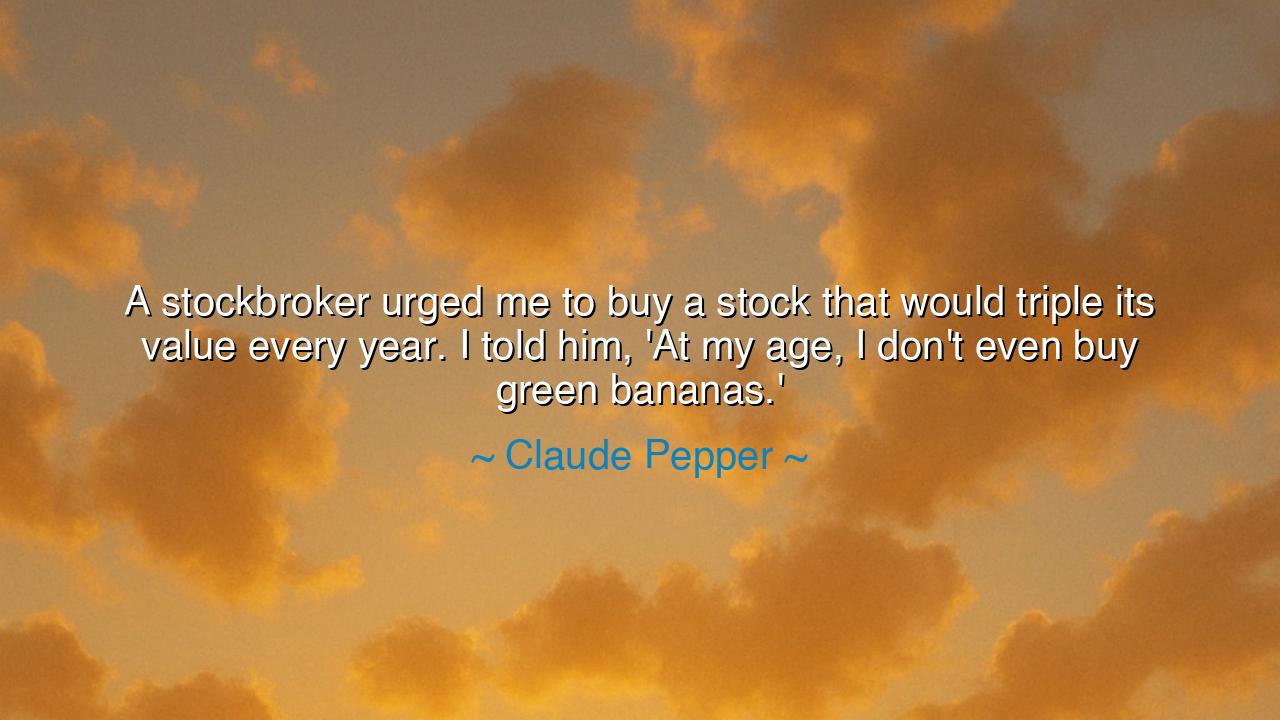
A stockbroker urged me to buy a stock that would triple its value
A stockbroker urged me to buy a stock that would triple its value every year. I told him, 'At my age, I don't even buy green bananas.'






"A stockbroker urged me to buy a stock that would triple its value every year. I told him, 'At my age, I don't even buy green bananas.'" These words from Claude Pepper, a renowned politician and advocate for the elderly, speak to the wisdom that comes with age and the recognition of life’s impermanence. In this humorous yet profound statement, Pepper reflects on the limitations of time that come with advancing years. The idea of buying green bananas—something that requires time to ripen—becomes a metaphor for investments, dreams, or plans that require long-term waiting. At an older age, the idea of waiting for something to bear fruit seems less practical. It is not about impatience but about a deep understanding of the finite nature of time and the wisdom that comes from having lived through enough seasons to know that some things simply need to be enjoyed in the present, not deferred indefinitely.
In the teachings of the ancients, time was seen as a precious and often fleeting resource, one that was to be used wisely. Seneca, the Roman Stoic philosopher, often discussed the importance of living fully in the present. He warned that too many people squander their lives by looking endlessly to the future and neglecting the value of the moment they are in. For Seneca, the idea of delaying enjoyment or delaying decisions until a future time was a mistake—because no one knows how long they will live, and time, once lost, is never regained. Seneca’s reflections on life’s brevity mirror the sentiment expressed by Pepper: to focus on the present and make wise use of the time you have.
Pepper’s quote also resonates with the wisdom of the Greek philosopher Epicurus, who taught that the pursuit of pleasure should be tempered with prudence and mindfulness of one’s mortality. Epicurus emphasized that true pleasure came not from material gain or endless future plans but from the contentment and peace of living simply in the present, with the people you care for, and with the knowledge that time is short. The notion of green bananas, something that must be waited for, is in direct contrast to the immediacy of life as Epicurus would have suggested. For those with less time ahead of them, the idea of waiting for future rewards feels illogical, and thus, one must focus on enjoying the fruits of life now.
Consider the example of Benjamin Franklin, who in his later years also reflected on the limited time one has and the necessity of making wise, present-focused decisions. Franklin, always a man of pragmatism, often spoke about the importance of living wisely, and he sought to find a balance between planning for the future and living with awareness in the present. His own commitment to self-improvement and service to others came from his understanding that life was short and that one could not afford to waste time chasing distant dreams or indulging in idle hopes. Franklin’s life serves as an example of how to make meaningful decisions in the present, investing in things that bring immediate satisfaction and value, much like the practical decision Pepper makes in his quote.
Pepper’s humor in this statement is not only a recognition of the limitations of age, but also a declaration of the clarity that age can bring. By the time we reach a certain point in life, we often have a clearer sense of what is realistically attainable and what is not. The idea of buying green bananas, of waiting for things to ripen or reach fruition, becomes a metaphor for the unpredictability of time. At an older age, one does not want to gamble on distant returns; rather, one seeks to enjoy what is immediately available—be it the warmth of relationships, the joy of present moments, or the satisfaction of decisions made with clarity.
The lesson here is deeply practical: as we grow older, we must learn to prioritize the things that matter most in the present, rather than deferring our happiness or security to an uncertain future. Pepper’s reflection reminds us that time is the most precious commodity we have, and that we should make wise use of it while we still can. The metaphor of not buying green bananas is a call to action—to make choices based on what we can control now, to invest in relationships and experiences that will give us joy and satisfaction in the present, and to avoid procrastination in the name of distant goals that may not come to fruition.
In practical terms, the lesson is to focus on the immediate and to be intentional with how we spend our time, whether we are young or old. Do not wait for tomorrow to pursue what you can enjoy today. Take care of your loved ones, nurture your friendships, pursue your passions, and make the most of the present moment. As we age, let us not focus solely on future rewards but also on the immediate joys that surround us. Just as we must avoid placing too much stock in future plans that may never come to fruition, we must also ensure that we are living fully today, appreciating what life gives us right now.






AAdministratorAdministrator
Welcome, honored guests. Please leave a comment, we will respond soon